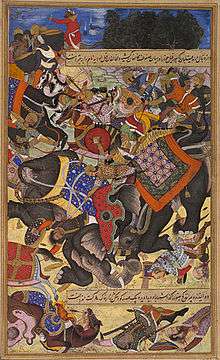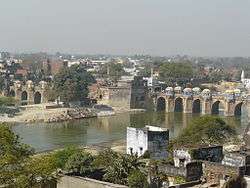Jaunpur, Uttar Pradesh
| Jaunpur जौनपुर | |
|---|---|
| City | |
|
Shahi bridge, Jaunpur | |
| Nickname(s): Jamadagnipura | |
 Jaunpur | |
| Coordinates: 25°44′N 82°41′E / 25.73°N 82.68°ECoordinates: 25°44′N 82°41′E / 25.73°N 82.68°E | |
| Country | India |
| State | Uttar Pradesh |
| District | Jaunpur |
| Founded | 1359 |
| Founded by | Feroz Shah Tughlaq |
| Named for | Muhammad bin Tughluq, whose given name was Jauna Khan |
| Government | |
| • Jaunpur (Lok Sabha constituency) | Krishna Pratap (BJP) |
| Area | |
| • Total | 4,038 km2 (1,559 sq mi) |
| Elevation | 82 m (269 ft) |
| Population (2001) | |
| • Total | 1,80,362 |
| • Rank | 43 in UP |
| • Density | 1,113/km2 (2,880/sq mi) |
| Languages | |
| • Official | Hindi, Urdu |
| Time zone | IST (UTC+5:30) |
| Vehicle registration | UP62 |
| Sex ratio | 925 females per 1000 males ♂/♀ |
| Website | http://jaunpur.nic.in |
Jaunpur (Hindustani pronunciation: [dʒɔːnpʊr]) Hindi: जौनपुर is a city and a municipal board in Jaunpur district in the Indian state of Uttar Pradesh.
Jaunpur is located to the northwest of the district of Varanasi in the eastern part of the North Indian state of Uttar Pradesh. Demographically, Jaunpur resembles the rest of the Purvanchal area in which it is located: having good Human development index.
History
_-_Copy.jpg)
Jaunpur historically known as Sheeraz-e-Hind having its historical dates from 1359, when the city was founded by the Sultan of Delhi Feroz Shah Tughlaq and named in memory of his cousin, Muhammad bin Tughluq, whose given name was Jauna Khan.[2][3] In 1388, Feroz Shah Tughlaq appointed Malik Sarwar, an eunuch, who is notorious for having been the lover of Feroz Shah Tughlaq's daughter, as the governor of the region. The Sultanate was in disarray because of factional fighting for power, and in 1393 Malik Sarwar declared independence. He and his adopted son Mubarak Shah founded what came to be known as the Sharqi dynasty (dynasty of the East). During the Sharqi period the Jaunpur Sultanate was a strong military power in Northern India, and on several occasions threatened the Delhi Sultanate.


The Jaunpur Sultanate attained its greatest height under the younger brother of Mubarak Shah, who ruled as Shams-ud-din Ibrahim Shah (ruled 1402-1440). To the east, his kingdom extended to Bihar, and to the west, to Kanauj; he even marched on Delhi at one point. Under the aegis of a Muslim holy man named Qutb al-Alam, he threatened the Sultanate of Bengal under Raja Ganesha.[4]
During the reign of Husain Shah (1456–76), the Jaunpur army was perhaps the biggest in India, and Husain decided to attempt a conquest of Delhi. However, he was defeated on three successive attempts by Bahlul Khan Lodi. It is a dominant trend in modern historiography of the period that this defeat was a cause of a large number of eunuchs in the military ranks. Finally, under Sikandar Lodi, the Delhi Sultante was able to reconquer Jaunpur in 1493, bringing that sultanate to an end.
The Jaunpur Sultanate was a major center of Urdu and Sufi knowledge and culture. The Sharqi dynasty was known for its excellent communal relations between Muslims and Hindus, perhaps stemming from the fact that the Sharqis themselves were originally indigenous converts to Islam, as opposed to descendants of Persians or Afghans. Jaunpur's independence came to an end in 1480, when the city was conquered by Sikander Lodhi, the Sultan of Delhi. The Sharqi kings attempted for several years to retake the city, but ultimately failed.
Although many of the Sharqi monuments were destroyed when the Lodis took the city, several important mosques remain, most notably the Atala Masjid, Jama Masjid (now known as the Bari (big mosque) Masjid) and the Lal Darwaza Masjid. The Jaunpur mosques display a unique architectural style, combining traditional Hindu and Muslim motifs with purely original elements. The old bridge over the Gomti River in Jaunpur dates from 1564, the era of the MughalEmperor Akbar. The Jaunpur Qila, a fortress from the Tughlaq era, also remains in good form.
Jaunpur district was annexed into British India based on the Permanent settlement of 1779, and thus was subject to the Zamindari system of land revenue collection. During the Revolt of 1857 the Sikh troops in Jaunpur joined the Indian rebels. The district was eventually reconquered for the British by Gurkha troops from Nepal. Jaunpur then became a district administrative center.
Present state
There are currently some major industries operating in the city, and traditional industries such as perfume making have become increasingly unviable. Under the initiative of the UP government, an Industrial Area has been set up in the Sathariya region of the district to promote industrial growth and expansion. Land is being allotted to budding industrialists and the government has plans to help people of this region develop more and more industries. During the past three years Jaunpur city has experienced a growing corporate presence in financial services as well as in the organized retail sector.
Jaunpur is the district headquarters. The district has 2 Lok Sabha and 9 Vidhan Sabha constituencies.
Demographics
As per provisional data of 2011 census, Jaunpur had population of 1,80,362 of which male and female were 93,718 and 86,644 respectively. The literacy rate was 81.22 .With a sex ratio of 925 female per 1000 male. The district has a population density of 1,113 people per km2.[5]
Religion
Hiduism dominates the District of Jaunpur with 63.48% of the population registered as Hindus. Religions (Largest three) (Census 2011) 1.Hindus 114,496 2.Muslims 60,017 3.Not Stated 4,891
See http://www.census2011.co.in/census/city/150-jaunpur.html Hindi and Urdu are the main spoken languages in Jaunpur.
Rivers of Jaunpur
Gomti, Sai, Varuna, Pili, and Basuhi are the five rivers which make its land fertile.[6]
Transportation
Rail
Jaunpur is well-connected with all major cities of India thanks to Indian Railways. It has four major railway stations: Jaunpur City Railway Station(JOP) and Jaunpur Junction (JNU), Shahganj Junction (SHG), Janghai Junction, Kirakat railway station (KCT).
Road
Jaunpur is well-connected to Lucknow, Gorakhpur, Varanasi, Allahabad and other cities like Azamgarh, Mirzapur, Janghai, Sultanpur, Kerakat, Ghazipur etc. NH-56, SH-36 are the roadways connecting all major cities to Jaunpur.
Rulers
Sharqi Dynasty
- Data Deen Gaur
- Malik Sarwar Khwaja-yi Jahan (1394–1399)
- Malik Qaranful Mubarrak Shah (1399–1401)
- Ibrahim Shams-ud-Din (1401–1440)
- Mahmud Shah (1440–1458)
- Mohammed Shah Bhikan Khan (1458)
- Husain Shah (1458–1483)
Education
University
Veer Bahadur Singh Purvanchal University, formerly Purvanchal University, is in Jaunpur, Uttar Pradesh. It is one of the educational hubs of eastern Uttar Pradesh, established in 1987 as a residential-cum-affiliating university. It is named after Vir Bahadur Singh, former chief minister of Uttar Pradesh.
Institutes
Jaunpur district has more than 50 Graduate and post graduate institutes and more than 200 undergraduate colleges and more than 300 colleges up to high school. There is also a Jawahar Navodaya Vidyalaya situated 21 km south from the district headquarters on Lumbini - Duddhi Road in Katghara Village near Mariahu Tehsil.
Industries
SIDA (Satharia Industrial Development Authority)
Satharia Industrial Development Authority was established in November 1989 by the Govt. of Uttar Pradesh, under U.P. Industrial Area Development Act, 1976 to facilitate concentrated effort on Industrial development of eastern Uttar Pradesh.
In its 1st phase of activity, the authority has a fully developed growth center area on 508 acres of land, under growth center scheme of Govt. of India.
Virtually all kind of industrial, commercial and social infrastructural facilities, such as Medical, Educational, Residential, Roads, Transportation, drainage, Telecommunication, dedicated industrial power 33/11 KV supply, post office, bank, water supply, community center, shopping center, field hostel etc., have been fully established and are operative.[7]
Pepsico India Pvt. Ltd.
Pepsico Inc. is an American multinational food and beverage corporation headquartered in Purchase, New York, United States, with interests in the manufacturing, marketing and distribution of grain-based snack foods, beverages, and other products.
Hawkins Cooker Limited
Hawkins Cookers Limited is a company in India which manufactures pressure cookers and cookware based in Mumbai, Maharashtra. The company has three manufacturing plants at Wagle estate Thane, Hoshiarpur and Jaunpur.[8]
Local Media
Mostly all major English, Hindi and Urdu dailies including Times of India, Hindustan Times, The Hindu, Dainik Jagran, Amarujala, Hindustan, Rashtree Sahara, Inquilab, Hausla News available in Jaunpur. Hindi and Urdu dailies also have their bureaus in the city. Almost all big Hindi TV news channel have stringers in the city. Hindi newspaper Tarunmitra is also published from Jaunpur.
Landmarks
There are a number of tourist attractions in Jaunpur. Every year thousands of visitors come from every corner of the world to visit Jaunpur. The tourist attractions in Jaunpur include monuments, and holy places.
Monuments
- Shahi Bridge
- Shahi Quila Jaunpur Fort
Religious Sites


- Sheetala Chaukiyaa
- Maihar Devi
- Atala Masjid, Jaunpur
- Jama Masjid, Jaunpur
- Lal Darwaza Masjid, Jaunpur
- Khokri Masjid
Local products
- Famous Imarti, a sweet like Jalebi made from Urad
- Jaunpuri Mooli,[9] a daikon (radish) that grow up to four feet long
- Perfumes, or itra (in Urdu)
Banquet hall
- Pooja Palace, T.B. Hospital Road, Jaunpur
References
- ↑ "View at Juanpore, on the River Ganges". Wesleyan Juvenile Offering. IV: 60. June 1847. Retrieved 17 November 2015.
- ↑ Stan Goron and J.P. Goenka: The Coins of the Indian Sultanates, New Delhi: Munshiram Manoharlal, 2001.
- ↑ Sen, Sailendra (2013). A Textbook of Medieval Indian History. Primus Books. p. 98. ISBN 978-9-38060-734-4.
- ↑ Goron and Goenka, p. 343.
- ↑ "Jaunpur City : Census 2011 data".
- ↑ Cf. "Jaunpur" article in 1911 Encyclopædia Britannica, p.282.
- ↑ "About SIDA".
- ↑ Hawkins Cookers Limited
- ↑ "Jaunpur's raddish". Retrieved 16 March 2012.
External links
| Wikimedia Commons has media related to Jaunpur. |
| Wikisource has the text of the 1911 Encyclopædia Britannica article Jaunpur. |
![]() "Jaunpur". Encyclopedia Americana. 1920.
"Jaunpur". Encyclopedia Americana. 1920.
